Tags
The London Olympics are shaping up to be the gayest Games ever. Or so openly gay former Olympic participants claim. There is no denying that the London Organizing Committee of the Olympic Games (LOCOG) is going all out to make the Games as inclusive as possible; pledging to make this summer’s Olympics “a Games for everyone” was one of the biggest reasons London won the bid to be host. But if ‘gayest’ is defined by out athletes competing during the Olympics, just how gay the London Games will be remains to be seen. Not that the bar has been set very high by past Summer Olympic Games. In 2008, at the Beijing Games there were only ten out athletes, seven of whom took home medals. And at the Athens Games in 2004 only eleven gay Olympians competed. A mere seven gay athletes took part in the 2000 Sydney Games, but if you count those Olympians who came out after the Games too, the 2000 Olympics have been the gayest Games to date.
Of course when you feature 50 drag queens in your closing number, you know your Olympic Games have got to be considered pretty gay. Top that off with one event in which all three of the medal places at the podium were filled by a gay man, and you’re setting a pretty high bar. And having the first, and probably last, partnered pair of lesbians dueling it out for gold . . . well, those Aussies definitely know how to do gay. 31 LGB athletes participated at the Sydney Games, racking up 14 medals. But at the time of the Games, only a quarter of them were officially out. When you throw in gayness after the fact, and if you then also consider those who are not fooling anyone, many of the Olympics have been pretty darn pink. But will the London Games out out them all?
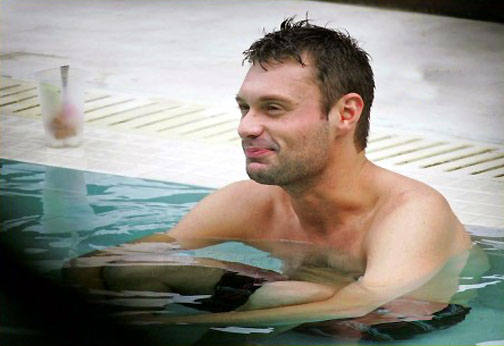
Ryan Seacrest has been signed by NBC to cover the London Games, and you can’t get much gayer than that.
Team Gay will get off to a great start in London this year with the ever popular Opening Ceremonies being soundtracked by Underworld duo Rick Smith and Karl Hyde. The two gay men have been hired by Director Danny Boyle, the artistic head of the London 2012 Olympics, to provide all of the music for the three-hour ceremony. Boyle, the director of the film Trainspotting, has worked with the duo on several of his films since featuring their track Born Slippy in that movie. And outside of the stadiums, I’ve already noted that former Olympian and gay hunk Mark Tweaksbury will be serving as Chef de Mission for the Canadian Olympic team, and NBC recently announced Ryan Seacrest will be taking on hosting duties for their coverage of the Games. There always have been many gay personalities – from reporters to commentators to coaches – involved in every Olympics, but it is the athletes who take center stage, and the gay athletes who most count toward determining how gay any Olympic Games is.
London is calling, but how many gay athletes will pick up the phone remains to be seen. By dropping women’s softball from the XXX Olympiad, the lesbian count has already seriously been diminished. And hottie out Dutch gymnast Jeffrey Wammes’ Olympic future is hanging in the balance, waiting for an unspecified ‘show of readiness’ from his teammate Epke Zonderland who his country named to fill their sole Olympic berth won at the Test Event in London earlier this year. Jeffrey sued the Royal Dutch Gymnastics Federation over that decision and now, per court order, which of them will represent their country at the Games will probably be decided at a World Cup event or May’s European Championships.
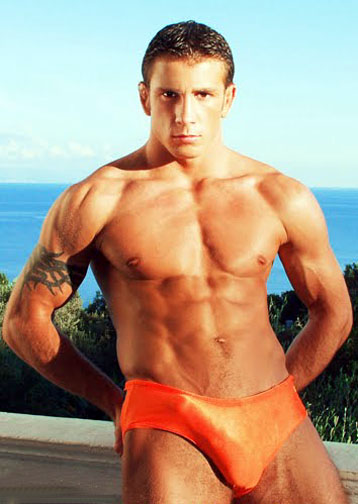
Coming up with the definitive count of gay athletes at each Olympic Games is difficult. For example, what do you to about Hungarian wrestling champion Gergo Szabo who was banned by his country after discovering he had performed in gay porn videos?
Waiting for Olympic Trial events and other Championship meets that will determine which gay athletes have a chance to take part in the London Olympics is the game of the day. Hans Peter Minderhoud, an Equestrian from The Netherlands has not qualified yet, but stands a good chance of scoring an Olympic berth for the London Games soon. Ditto for his boyfriend, fellow Dutchman Edward Gal. Lesbian boxer Patricia ‘Peanut’ Manuel is also on tap for a spot on the Olympic team depending on how her next few matches go. Great Britain hurdler Rob Newton, who appeared at the Athens Games, hopes to represent his country again this year. And two gay swimmers who are among the oldest Olympic trial qualifiers ever, 37-year-olds Brian Jacobsen and Jeff Commings, will find out if they get to head for London at the U.S. Swimming Olympic Trials in June. The list of potential out Olympians is amazingly long; if most win their spots on their respective teams London’s claim of being the gayest Olympics yet may hold true.
So far, however, there are only six out athletes who have qualified for the London Games: French handballer Alexandra Lacrabère, French pentathlonist Florian Bou, Australian diver Matthew Mitcham, Australian volleyballer Natalie Cook, U.S. equestrian Guenter Seidel, and Marilyn Agliotti, a member of the Gold Medal winning Dutch Hockey team. And while that seems to be a small number, it’s not that the ratio of gay athletes compared to their straight brethren is small but rather that most gay athletes remain firmly in the closet while they are actively competing in their chosen sport.
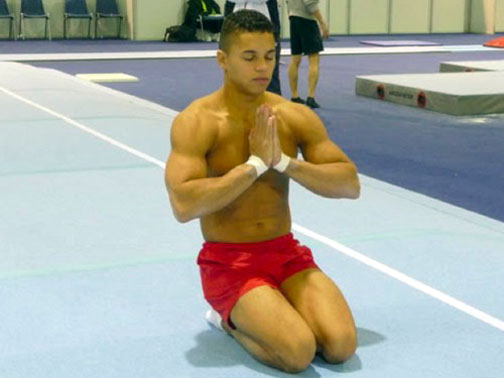
Openly gay Dutch gymnast Jeffrey Wammes helped win his country an Olympic berth but may not be the athlete to represent his homeland in London. Let’s all say a prayer.
Robert Dover, a six time gold medalist in equestrian events and one of the handful of Olympians who has been out during his entire Olympic career says that there are many gay athletes at the Olympics. “After six Olympics, I know they’re in every sport. You just have to spend one day in the housing, the gyms, or at dinner to realize we’re all over,” he said while noting that many athletes still do not feel free to identify themselves publicly as being gay.
Canada’s Chef de Mission for the London Games, Mark Tweaksbury, a gold medalist who now lives his life as a openly gay man concurs. Since acknowledging his sexuality he says he has been approached by many closeted athletes. “For sure, there’s been lots of people that have come out,” he said, referring to those with whom he has spoken on a very private and intimate level. “Some have been surprising ones. I never would’ve thought that this person was a lesbian or this person was a gay man, and it’s been great. It’s been nice to have that and just to sort of empathize with them and feel their pain a little bit.”
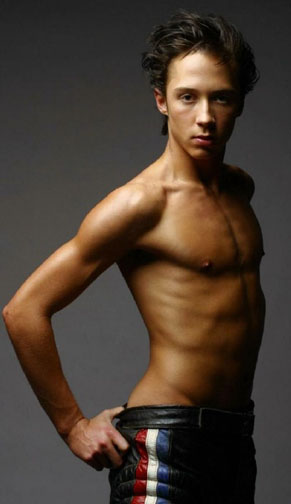
Even though his closet was doorless, Jonny Weir did not officially come out as gay during the Winter 2010 Olympic Games.
Even those who are out to their teammates and fellow athletes may still be closeted to the world. Outsports, the leading internet site covering the LGBT sport world noted in its Athens Olympics coverage that a lesbian Olympian at those Games was not out publicly, despite not being shy about going to gay bars. A bouncer at a local gay club wrote to their editorial staff that the athlete “came in several times along with most of the team. She never made a big deal about who she was or where she was going, and of course seeing female athletes in the bar was commonplace. She hooked up occasionally, and I watched her make out a few times.”
That fine line between being privately out and not publicly out is one many gay athletes chose to walk. Gay Olympian, Blake Skjellerup said in an interview with DNA Magazine that he wasn’t hiding his sexuality at the 2010 Winter Olympics, as he walked around the venue hand in hand with his boyfriend, but he just hadn’t “officially” said anything. He also told the magazine that he waited to come out until after the Olympics because he wanted to have the focus entirely on his skating, and not have people focusing more on his sexuality.
Ryan Quinn, a former collegiate cross-country skier and out athlete feels many gay athletes debate whether the extra media attention is worth the additional stress while trying to win a medal. He says that for many it’s not concern over media coverage that keep them from coming out, it is that their focus is completely on the competition. Being an Olympic athlete requires full-time dedication and a lot of things get put on hold. “The lifestyle of an Olympic athlete who trains hundreds of hours a year, for upwards of a decade, travels 300 days or more per year, living each week in a new country for a camp or race series, is all the while focused completely on one goal, often years in the future.” He says that it is just easier to hide and deal with one’s sexuality later.
Dover agrees, saying, “The reason many of them aren’t out is because they’re focused on their job during this time when sports is the No. 1 thing in their lives.”
Quinn also noted that most Olympians are under thirty, a time many young people are still working through their sexual identities. He interviewed a closeted Olympian, whose identity he would not reveal. “I thought I was the only gay athlete who felt like this, but apparently, it’s pretty common for many of us to hold out on figuring out our sexuality until after we’re done competing,” said his anonymous source. “Many of my straight teammates also don’t seem to really get into serious relationships until they near retirement.”
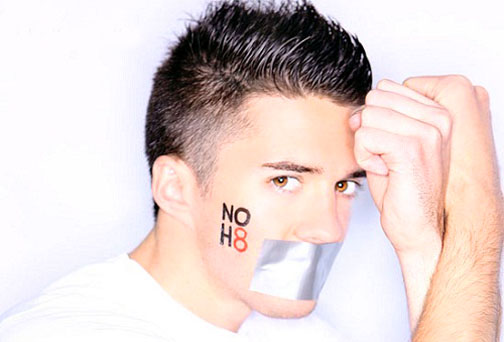
Like many other athletes, Gay Olympian Blake Skjellerup did not come out until after the Olympics were over.
Tweaksbury too feels for many gay Olympians it’s more a question of priorities. “An athlete’s here to compete. Most athletes, when you’re competing, your private life is parked,” he said. “ It’s the same for straight athletes. They’re not out there thinking about who they’re going to date. They’re out there getting ready to win a gold medal. And they often put their quote-unquote ‘real lives’ on hold until sport is done.”
Some Olympians choose to compete as proud gay men, but have also known the Games as closeted competitors. Both U.S. divers Patrick Jeffrey and David Pichler participated in two Summer Olympics, both chose to be out for their second Olympic appearance. And both were at the ‘96 Olympic Games, Jeffrey diving as an openly gay Olympian, and Pichler being out to family and friends but not publicly. “Among the other platform divers, we were both out and about in the diving world,” says Pichler. “I came out my junior year of college but I wasn’t running around. I was doing my own thing in sports and school.”
Pichler says the pressure he felt during the Olympics came from athletics, not from being openly gay. “It kind of distracted me,” he says. “But for most people, it wasn’t that big of an issue.”
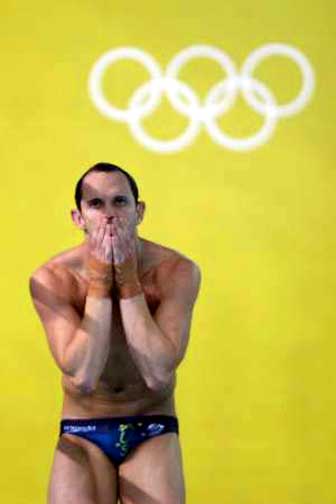
Australian diver Matthew Helm was not out in 2004 when he won the silver medal at the Olympics. But kinda was in this picture from those Games.
While the total number of gay Olympians continues to rise, by far the majority have not come out until after their days of competing are over. Focusing on their sport is one reason many wait. A concern over increased media attention is another; being a participating Olympic athlete and openly gay is no easy matter. Being the focus of the media during the Games can be distracting. And many feel the possibility of garnering lucrative sponsorships from their performance during the Games can be jeopardized when sexuality is taken into account.
Blake admits he knows “multiple people” who are closeted in sport. “There are a variety of reasons for not coming out, but the common thread is perception,” he says. “They worry about how them coming out will affect their place in the sport. They worry about what the fans will think of them. They worry.”
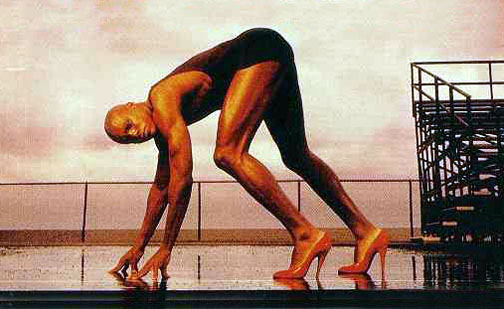
It is assumed nine time Gold medalist Carl Lewis has never came out partially due to concerns over losing lucrative endorsement deals. Not that that helped, just the suggestion he was gay was enough to send sponsors fleeing.
The possible loss of endorsement deals was not one of Blake’s concerns, however. He didn’t have any. “I still don’t have any major corporate sponsor,” he says. “I do know that I have the entire GLBT community of New Zealand behind me – it’s really amazing to feel that and having their support is great, but at the end of the day it doesn’t pay the bills!”
Blake says that sexuality is not what defines an athlete, that he believes you always must place your sport first. But he does understand how concerns over money can effect an athlete’s decision on coming out. “I’m sympathetic to the worry that coming out could lose sponsors,” he says. “It’s a sad situation for people who have to hide who they are for the sake of the dollar.”
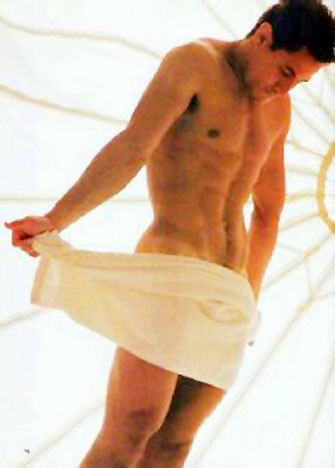
Gold Medalist Greg Louganis, with the dual stigma of being a gay man and HIV + failed to get the sponsorship contracts he should rightfully have earned for his Olympic record.
It is the fear of losing endorsement opportunities and being blacklisted that keep many of the world’s current and former top Olympic stars from opening their closet doors. Dr. Harry Edwards, one of the world’s leading sports sociologist, says Carl Lewis – the ten time Olympic medalist in track and field – never came out publicly because “it wouldn’t look too good to have him on a Wheaties box” if people knew his sexual preference. Though voted Sportsman of the Century by the International Olympic Committee and being named Olympian of the Century by the sports magazine Sports Illustrated, the public’s perception of Lewis as a gay man probably hurt his marketability despite his denial that he was gay. “It doesn’t matter what Carl Lewis’s sexuality is,” high jumper and fellow Olympian Dwight Stones said. “Madison Avenue perceives him as homosexual.”
Lewis lost out on a deal with Coca-Cola and Nike dropped him as a spokesman right after his Olympic appearance. “If you’re a male athlete, I think the American public wants you to look macho,” said Don Coleman, a Nike representative. And that is what athletes have to contend with, even when they have not opened their closet doors.
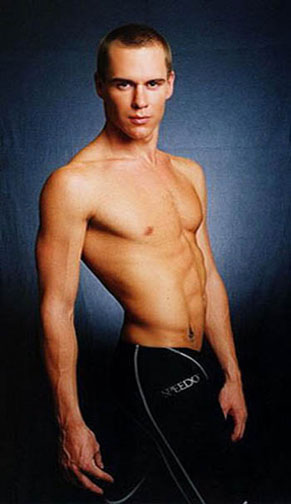
Dutch Swimmer Johan Kenkhuis was one of only eleven openly gay athletes to participate in the 2004 Olympic Games in Athens.
So you can imagine the reception Greg Louganis – one of the more well-known gay Olympians – received. Speedo stuck by their man, but most of his corporate sponsors dropped him as a client when they heard the news of his HIV status, and the four time gold medallist failed to get the endorsement deals his accomplishments should have resulted in. Consider alone that NBC has never offered Greg a spot as a commentator for their Olympic coverage when he’d be such an obvious choice as a talking head while televising the diving events.
The anonymous athlete that Quinn spoke with shared his belief that today financial considerations keep many athletes in the closet. “Athletes who are gay have nothing material to gain by coming out publicly,” he said. “ And as an athlete, you must think about things in terms of their utility, especially because sport is now both financially and athletically competitive. No longer is it just, ‘What else can I do to get that extra edge?’ The mantra now becomes, ‘What else can I do to appease and win over sponsors?’”
Aussie diver Matthew Mitcham, the only out male Olympian at the Beijing Games was very surprised he was the only openly gay man in the Olympic village. “It’s a little bit sad I think, because statistically there should be a lot more but, you know what, it’s each to one’s own,” he said. “ But I’m proud to be here, proud to be that one, that lots of other people can look up to.”
Mitcham disclosed his sexual orientation to The Sydney Morning Herald three months before heading to Beijing. His stunning dive – awarded the highest score in Olympic history – that stopped the Chinese clean sweep of the diving gold medals earned him a great deal of attention. And he hired sports manager Dave Flaskas, who looks after the career of Olympic champion Ian Thorpe, with expectations of sponsorship dollars flowing his way. Months after the Olympics, he was still waiting for endorsement deals. In February of the next year he finally landed a one year contract with Telstra, Australia’s largest phone company.
Mitcham says, however, the down economy and other forces may have more to do with the lack of deals than his being gay does. Or so he hopes. “I haven’t experienced any homophobia in sport but I’m hoping I’m not experiencing any in the corporate world because I haven’t had any companies rushing to sponsor me,” he said. “It took me a very long time to secure any form of sponsorship after the Olympics, and that’s still my only sponsorship.”
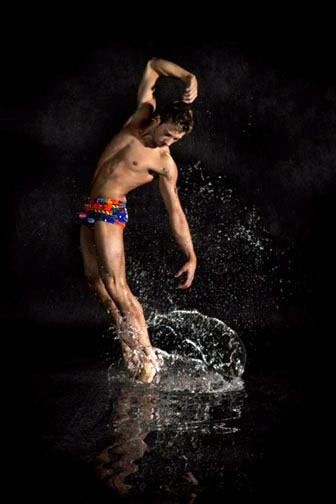
Mitcham landed an endorsement deal with Funky Trunks, Australia’s iconic designer of the original retro swimming trunk.
Fellow diver Alex Croak, a longtime friend who trains with Mitcham, is not so sure. “Coming out may not have been very wise of him,” he said. “I’m not an expert in marketing and don’t know what companies look for, but perhaps it hurt him as it is a risk for companies to take.”
But Jim Andrews, who is an expert in marketing feels otherwise. “Opportunities really are limited for most Olympic athletes,” said the senior vice president at leading sponsorship development firm IEG . “We always talk about who’ll win the marketing gold, but when we go back and look at the winners, it’s a pretty small group that’s gotten substantial money. From a corporate standpoint, these folks drop off the radar screen [after the Olympics]. And diving is not a sport that we are tuning in to watch every Sunday.”
Mitcham is content for the time being having enough money to pay his bills and focus on his diving. “I never expected to make money from the sport anyway, and that’s why I’m chipping away at a degree while I’m training,” he said. “Diving is not a high-profile sport, so hopefully the better I do, the more interest the general public will have, and the more sponsorship dollars it will attract.”
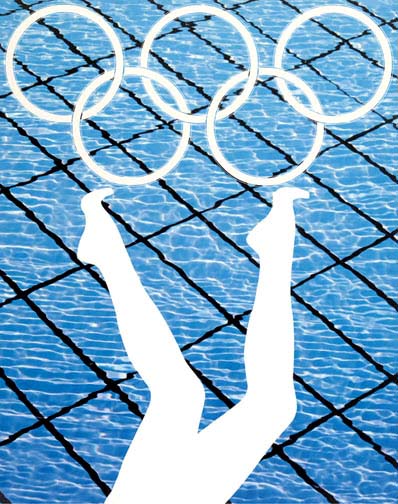
One of the six official London Olympics Posters celebrates diving. And what can only be the silhouette of a gay athlete.
He has since landed a second endorsement deal, this one with swimsuit apparel company Funky Trunks, whose founder Duncan McLean said his company wanted Mitcham because he looked good in its product and his sexuality was not an issue. Before Beijing, Mitcham was working in an office and trying to balance training for the Games – a very stressful lifestyle he admits. He hopes with money coming his way in the lead-up to London, diving can be his priority.
“Money was a huge stress leading into the Olympics for two years and for that to not be a massive burden on me leading into the next Olympics would be nice,” he said. “But that’s an ideal world and who knows what’s going to happen.”
A member of the U.S. Olympic team in 2000 and 2004, a gay man who still has not come out publicly because he remains competitive and is not out to his family, teammates or coaches, says regardless of Mitcham’s experience gay athletes are still concerned about losing big sponsorship deals because of their sexual orientation. “It’s gotten better over the years, but America is still homophobic and so quick to judge people,” he said . “I knew a couple of athletes who were also gay (at the 2004 Olympics where he won a silver medal), but everybody shows up, remains anonymous, and nobody wants to bring all of the attention on them.”
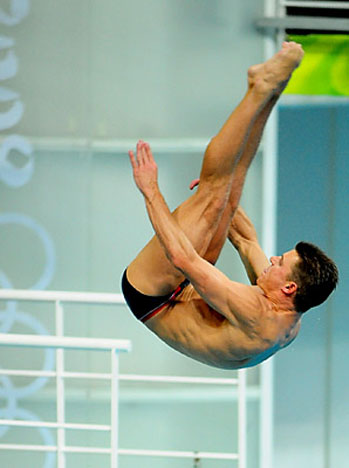
Openly gay U.S. diver David Pichler was elected the team captain of the American swim team at the 2000 Olympics.
He too agrees that there are many more gay Olympians than most would suspect. “I met athletes from other countries who, you know, you just discover are gay after being around a person and spending that much time with them,” he said.
Though closeted, he says he checked out the gay bars in Sydney and Athens, and hung out with fellow gay Olympians. And though he came home with medals at both Games, he says there was a small bit missing from his Olympic experience due to his being gay. “Definitely, you want someone to share those moments with, whether you’re gay or straight,” he said. “Just being able to share those moments of fame with someone that you love and care for, I missed that part of it.”
Perhaps that is reason enough for a gay Olympian to be out, even if it is only among his teammates and fellow competitors. After the years of effort they put in to reach the pinnacle of their careers, after all of the sacrifice and hard work required to land a spot on an Olympic team, sharing that golden moment with someone you love can, and should, be the important thing. By being an openly gay Olympian Mitcham was able to climb into the stands and kiss his boyfriend Flethcher after the medal ceremony. That the organizers of the London Games are trying to make their Olympics inclusive may allow other gay athletes to experience that type of moment this year themselves.
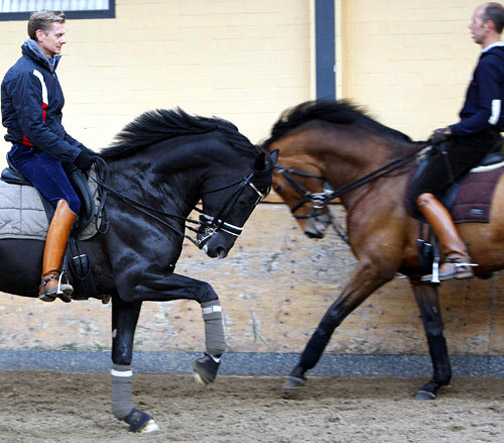
Hans Peter Minderhoud and his boyfriend Edward Gal are both Olympic hopefuls. Considering that at the Sydney Games of the 12 people given medals at the ceremony for the team dressage event all the men were gay, you can bet that at least one gay man will qualify with his horse for London.
At the very least, the LOCOG’s efforts should make it easier for Olympians to be openly gay while competing in their chosen sport. Ensuring homophobia is not a part of the Games will go a long way in encouraging the participation of openly gay athletes. “Sports is not an easy thing,” Mitcham says. “And if negative things come because of your sexuality…it’s not something that an athlete should have to deal with. My hope for gay athletes is that their sexuality is not an issue, that they don’t have to deal with adversity or controversy.”
The attitude of the Organizing Committee should make a difference come July and may help them reach their goal of making the London Olympics the gayest Games ever. Resigning those 50 drag queens from the Sydney Games might not be a bad idea either.
[‘The XXX Games’ are a series of posts about hot Olympians, gay competitors – both present and past – and general articles about the 2012 London Olympics of interest to gay men. So, yeah, lots of hot male eye candy. Click the XXX Games graphic above for additional news, stories, and pictures.]

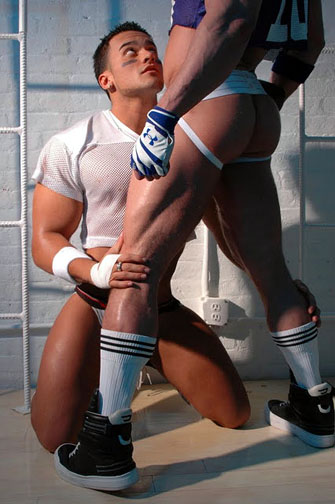
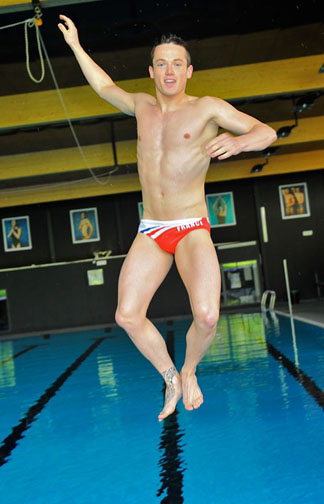
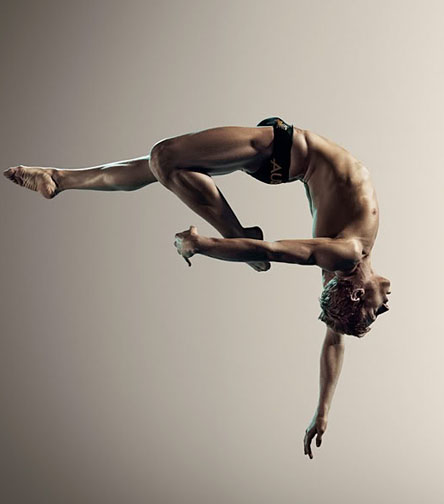

Great article!
I did not realise there were that many out gay men in the olympics.
Is that just me or is it divers make up the biggest number of them?
I know Tyler, and you think gymnastics would be the chosen sport. But it looks like until they allow mens synchronized swimming the diving board will continue to be out Olympian’s favorite apparatus.
That is why Beachlover isn’t contributing his great reads anymore, you hired him as editor for the never ending facts on the Olympic Games!
Please dance with the devils in the city of angels, not drooling over the boring sportsmen in the city of London.
Noted Hendrik.
But the guys are hot and there are lots of gay angles to the Olympics.
There’s also evidently much interest in both; those posts are driving a lot of traffic to this blog.
So sorry, but on a positive note for you, there’s only another 100 days to go.
🙂
I enjoy that your blog covers a wide variety of subjects and I have been enjoying your olympic articles too so I hope you will continue to have them. I also hope you will be doing a few on those hot water polo players.
Thanks David, I haven’t decided which water polo guy to profile yet. They’re all hunks. Maybe I’ll do a whole team (come to think about it I’d love to do a whole team!)
🙂
Who are the two on the picture just under the title ?
Sorry, I have no idea – two male models but I didn’t even have a photographer’s source on the photo.